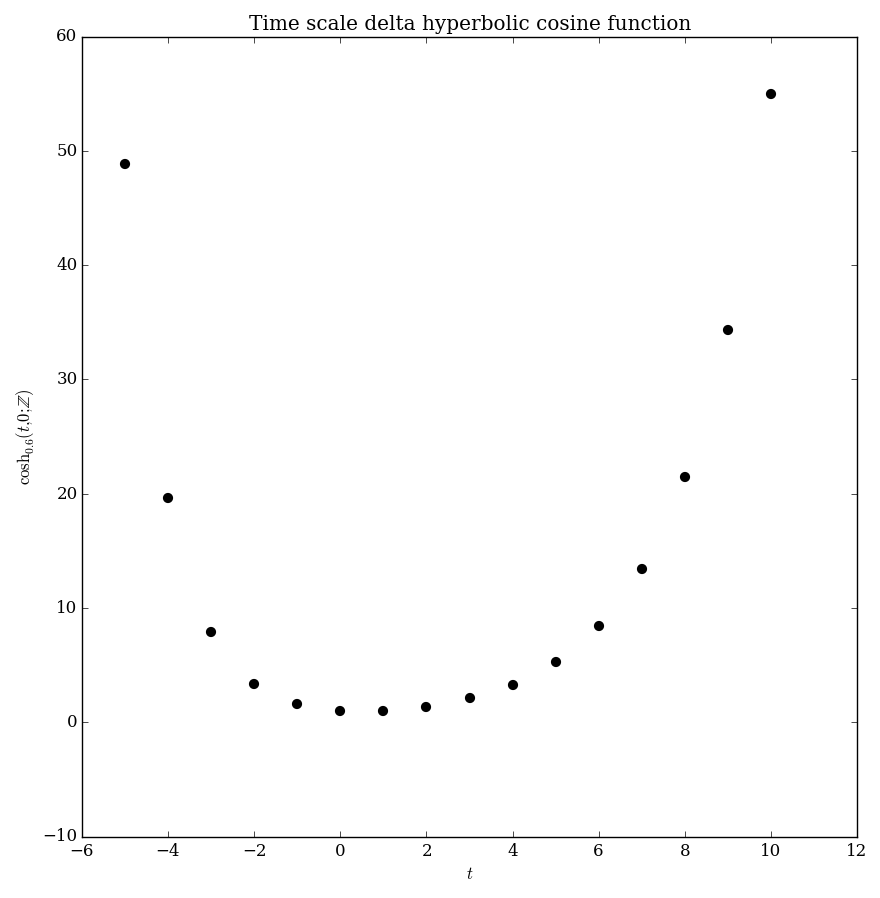Difference between revisions of "Delta cosh"
From timescalewiki
| (14 intermediate revisions by the same user not shown) | |||
| Line 1: | Line 1: | ||
| + | Let $p \in C_{rd}$ and $-\mu p^2$ be a [[regressive function]]. Then the $\Delta$-hyperbolic cosine function is defined by | ||
| + | $$\cosh_p(t,s) = \dfrac{e_p(t,s)+e_{-p}(t,s)}{2}.$$ | ||
| + | |||
| + | <div align="center"> | ||
| + | <gallery> | ||
| + | File:Integercosh,a=0.6,s=0plot.png|Graph of $\cosh_{0.6}(t,0;\mathbb{Z})$. | ||
| + | </gallery> | ||
| + | </div> | ||
| + | |||
| + | =Properties= | ||
| + | [[Derivative of delta cosh]]<br /> | ||
| + | [[Delta cosh minus delta sinh]]<br /> | ||
| + | [[Delta hyperbolic trigonometric second order dynamic equation]]<br /> | ||
| + | |||
| + | =Examples= | ||
{| class="wikitable" | {| class="wikitable" | ||
|+Time Scale $\Delta$-$\cosh_1$ Functions | |+Time Scale $\Delta$-$\cosh_1$ Functions | ||
| Line 12: | Line 27: | ||
|- | |- | ||
|[[Multiples_of_integers | $h\mathbb{Z}$]] | |[[Multiples_of_integers | $h\mathbb{Z}$]] | ||
| − | | $\cosh_1(t,0)=\dfrac{1}{2}\left( (1-h)^{\frac{t}{h}} + (1+h)^{\frac{t}{h}} = \displaystyle\sum_{k=0}^{\infty} h_{2k}(t,0 | + | | $\cosh_1(t,0)=\dfrac{1}{2}\left( (1-h)^{\frac{t}{h}} + (1+h)^{\frac{t}{h}}\right) = \displaystyle\sum_{k=0}^{\infty} h_{2k}(t,0) $ |
|- | |- | ||
| [[Square_integers | $\mathbb{Z}^2$]] | | [[Square_integers | $\mathbb{Z}^2$]] | ||
| Line 26: | Line 41: | ||
| | | | ||
|} | |} | ||
| + | |||
| + | <center>{{:Delta special functions footer}}</center> | ||
| + | |||
| + | [[Category:specialfunction]] | ||
| + | [[Category:Definition]] | ||
Latest revision as of 14:13, 28 January 2023
Let $p \in C_{rd}$ and $-\mu p^2$ be a regressive function. Then the $\Delta$-hyperbolic cosine function is defined by $$\cosh_p(t,s) = \dfrac{e_p(t,s)+e_{-p}(t,s)}{2}.$$
Properties
Derivative of delta cosh
Delta cosh minus delta sinh
Delta hyperbolic trigonometric second order dynamic equation
Examples
| $\mathbb{T}=$ | $\cosh_1(t,0)=$ |
| $\mathbb{R}$ | $\cosh_1(t,0)=\cosh(t)$ |
| $\mathbb{Z}$ | |
| $h\mathbb{Z}$ | $\cosh_1(t,0)=\dfrac{1}{2}\left( (1-h)^{\frac{t}{h}} + (1+h)^{\frac{t}{h}}\right) = \displaystyle\sum_{k=0}^{\infty} h_{2k}(t,0) $ |
| $\mathbb{Z}^2$ | |
| $\overline{q^{\mathbb{Z}}}, q > 1$ | |
| $\overline{q^{\mathbb{Z}}}, q < 1$ | |
| $\mathbb{H}$ |
$\Delta$-special functions on time scales | ||||||
$\cos_p$ |
$\cosh_p$ |
$e_p$ |
$g_k$ |
$h_k$ |
$\sin_p$ |
$\sinh_p$ |
